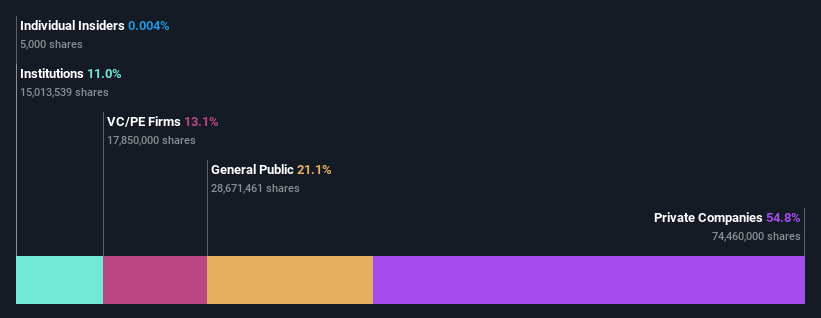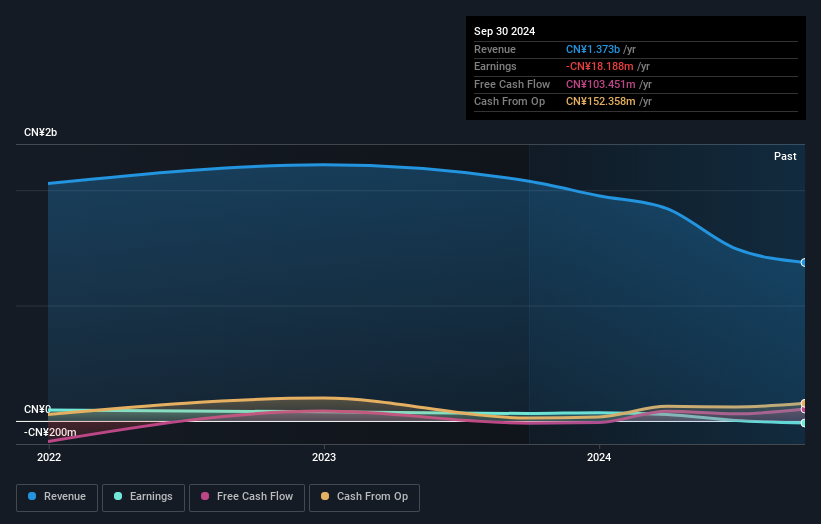Private companies invested in China Post Technology Co., Ltd. (SHSE:688648) copped the brunt of last week's CN¥389m market cap decline

Key Insights
- Significant control over China Post Technology by private companies implies that the general public has more power to influence management and governance-related decisions
- The top 2 shareholders own 62% of the company
- Institutional ownership in China Post Technology is 11%
Every investor in China Post Technology Co., Ltd. (SHSE:688648) should be aware of the most powerful shareholder groups. And the group that holds the biggest piece of the pie are private companies with 55% ownership. Put another way, the group faces the maximum upside potential (or downside risk).
And following last week's 12% decline in share price, private companies suffered the most losses.
In the chart below, we zoom in on the different ownership groups of China Post Technology.
Check out our latest analysis for China Post Technology

What Does The Institutional Ownership Tell Us About China Post Technology?
Institutional investors commonly compare their own returns to the returns of a commonly followed index. So they generally do consider buying larger companies that are included in the relevant benchmark index.
As you can see, institutional investors have a fair amount of stake in China Post Technology. This can indicate that the company has a certain degree of credibility in the investment community. However, it is best to be wary of relying on the supposed validation that comes with institutional investors. They too, get it wrong sometimes. When multiple institutions own a stock, there's always a risk that they are in a 'crowded trade'. When such a trade goes wrong, multiple parties may compete to sell stock fast. This risk is higher in a company without a history of growth. You can see China Post Technology's historic earnings and revenue below, but keep in mind there's always more to the story.

China Post Technology is not owned by hedge funds. China Post Group Corporation Limited is currently the largest shareholder, with 49% of shares outstanding. Meanwhile, the second and third largest shareholders, hold 13% and 2.6%, of the shares outstanding, respectively.
After doing some more digging, we found that the top 2 shareholders collectively control more than half of the company's shares, implying that they have considerable power to influence the company's decisions.
While studying institutional ownership for a company can add value to your research, it is also a good practice to research analyst recommendations to get a deeper understand of a stock's expected performance. As far as we can tell there isn't analyst coverage of the company, so it is probably flying under the radar.
Insider Ownership Of China Post Technology
The definition of company insiders can be subjective and does vary between jurisdictions. Our data reflects individual insiders, capturing board members at the very least. Management ultimately answers to the board. However, it is not uncommon for managers to be executive board members, especially if they are a founder or the CEO.
Insider ownership is positive when it signals leadership are thinking like the true owners of the company. However, high insider ownership can also give immense power to a small group within the company. This can be negative in some circumstances.
Our information suggests that China Post Technology Co., Ltd. insiders own under 1% of the company. But they may have an indirect interest through a corporate structure that we haven't picked up on. It has a market capitalization of just CN¥2.9b, and the board has only CN¥108k worth of shares in their own names. Many investors in smaller companies prefer to see the board more heavily invested. You can click here to see if those insiders have been buying or selling.
General Public Ownership
With a 21% ownership, the general public, mostly comprising of individual investors, have some degree of sway over China Post Technology. While this group can't necessarily call the shots, it can certainly have a real influence on how the company is run.
Private Equity Ownership
With an ownership of 13%, private equity firms are in a position to play a role in shaping corporate strategy with a focus on value creation. Some might like this, because private equity are sometimes activists who hold management accountable. But other times, private equity is selling out, having taking the company public.
Private Company Ownership
Our data indicates that Private Companies hold 55%, of the company's shares. It might be worth looking deeper into this. If related parties, such as insiders, have an interest in one of these private companies, that should be disclosed in the annual report. Private companies may also have a strategic interest in the company.
Next Steps:
It's always worth thinking about the different groups who own shares in a company. But to understand China Post Technology better, we need to consider many other factors. Be aware that China Post Technology is showing 2 warning signs in our investment analysis , and 1 of those is concerning...
Of course, you might find a fantastic investment by looking elsewhere. So take a peek at this free list of interesting companies.
NB: Figures in this article are calculated using data from the last twelve months, which refer to the 12-month period ending on the last date of the month the financial statement is dated. This may not be consistent with full year annual report figures.
New: AI Stock Screener & Alerts
Our new AI Stock Screener scans the market every day to uncover opportunities.
• Dividend Powerhouses (3%+ Yield)
• Undervalued Small Caps with Insider Buying
• High growth Tech and AI Companies
Or build your own from over 50 metrics.
Have feedback on this article? Concerned about the content? Get in touch with us directly. Alternatively, email editorial-team (at) simplywallst.com.
This article by Simply Wall St is general in nature. We provide commentary based on historical data and analyst forecasts only using an unbiased methodology and our articles are not intended to be financial advice. It does not constitute a recommendation to buy or sell any stock, and does not take account of your objectives, or your financial situation. We aim to bring you long-term focused analysis driven by fundamental data. Note that our analysis may not factor in the latest price-sensitive company announcements or qualitative material. Simply Wall St has no position in any stocks mentioned.
About SHSE:688648
China Post Technology
Engages in the research and development, design, production, sale, and related servicing of intelligent logistics systems in China.
Adequate balance sheet and slightly overvalued.
Market Insights
Community Narratives




